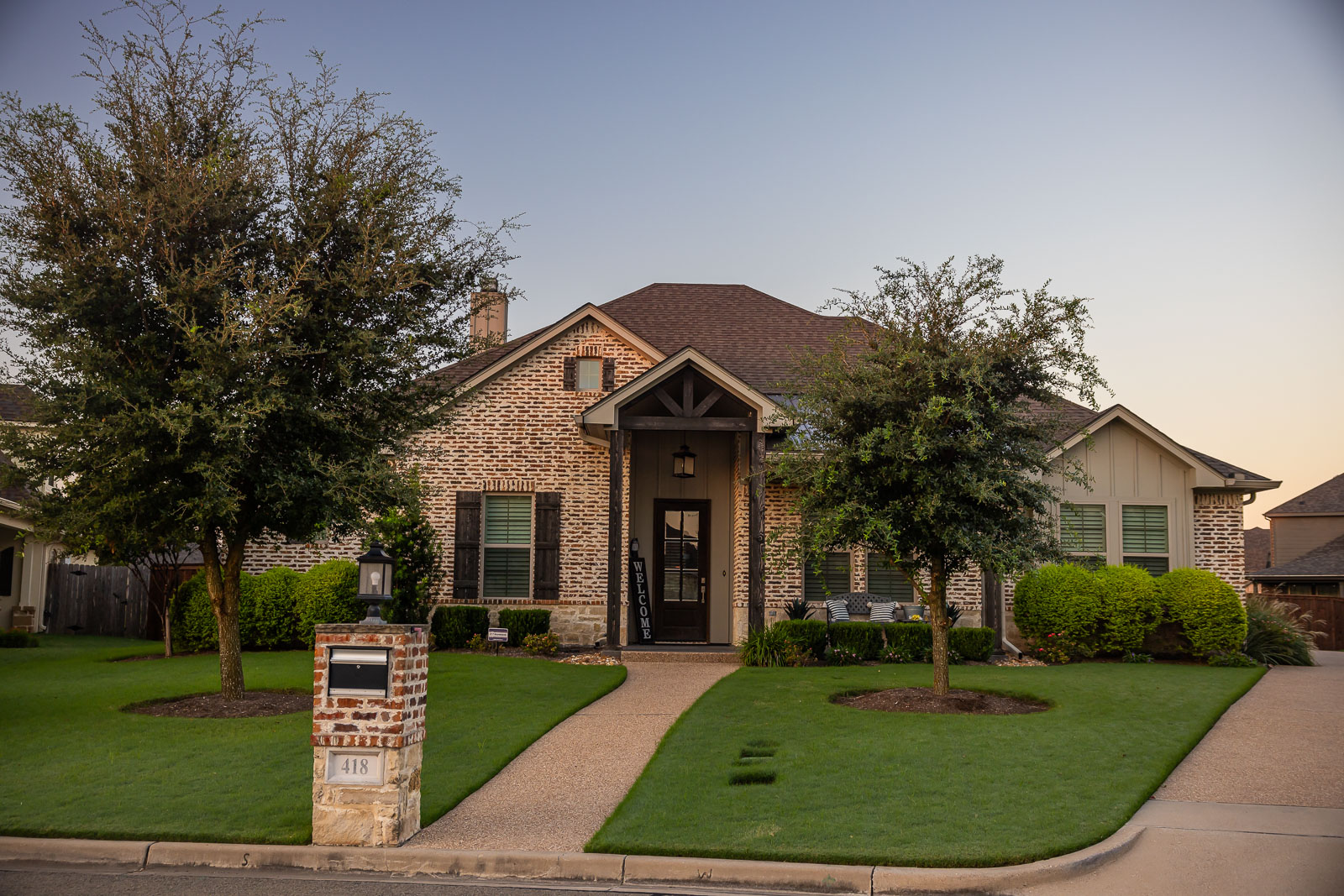
Written By Barry Marusak
Struggling to decide between mulch vs. rocks for your landscape beds? Which will look the best? Which can really hold up to the Central Texas heat?
It is easy to feel overwhelmed, especially when you are investing time and money into your outdoor space and just want to make the right call.
So, is mulch or rocks better for landscaping in Waco, TX? The honest answer is: it depends on what your landscape needs. In most cases, mulch is better for supporting healthy plants, but rock can be incredibly useful in certain situations.
Let’s explore what makes each material unique, how the Central Texas climate should affect your choice, and how you can even use both mulch and stone together for a beautiful result.

Mulch vs. Rocks: Which is Best for Our Central Texas Climate?
If you’ve lived through a Central Texas summer, you know the climate isn’t exactly gentle on landscapes. Intense heat, drought, rainstorms, and wind can all take a toll on your plantings. That’s why the ground cover you choose for your landscape beds plays a bigger role than you might think.
Before we dive into the pros and cons of mulch vs. rocks, it’s important to take a step back and think about what landscapes in Texas really need to thrive. In Waco and surrounding areas, the climate calls for a solution that can retain moisture, regulate soil temperature, and withstand long periods without rain. It is also wise to consider erosion control and the health of your plants year-round.
Both mulch and rock can play a role in achieving those goals, but they behave very differently under the hot Central Texas sun.

Mulch and Stone Landscaping: Pros and Cons
Once you understand how critical water retention and heat management are in the Central Texas climate, it is easy to see why choosing between mulch and stone landscaping matters. Each material has its place in a smart landscape design, but they serve different purposes and come with different advantages and limitations.
The Benefits of Mulch
Mulch is the go-to for landscape beds that include plantings in Central Texas. Mulch offers multiple benefits that support your plant’s health in our hot and dry conditions:
- Moisture Retention: Mulch slows evaporation and helps your soil stay moist, which can be crucial during long stretches without rain.
- Soil Temperature Regulation: While rocks tend to reflect and trap heat, mulch helps moderate soil temperature, keeping roots cooler in the summer and warmer in the winter.
- Nutrient Booster: Organic mulch breaks down over time and adds valuable nutrients back into your soil.
- Weed Buster: A thick layer of mulch is sterile, which means it helps reduce weed growth by blocking sunlight.
- Curb Appeal: Mulch offers a more natural look that can boost curb appeal.
While mulch does need to be refreshed annually, its many benefits, especially for plantings, outweigh the extra maintenance.

When Rock Makes Sense
Rock is not just a decorative choice for your landscape; in fact, it can solve some specific landscape challenges we regularly see here in Waco:
- Water Flow Management: If your property has surface water that tends to wash mulch away, rock can be a more practical solution. We often design dry creek beds or curved stone channels to guide water where it needs to go. Not only does this control erosion and protect your plant beds, but it also adds a natural visual element to your landscape.
- Under Pots and Planters: A layer of 2-3 inch cobblestone underneath glazed pots can improve drainage and allow irrigation to flow more effectively. It also helps prevent pots from sitting in soggy soil, which can cause rot.
In our climate, rock has its drawbacks. It is not weed-proof, and it does not offer the same moisture retention or insulation as mulch. Rocks can make things hotter and drier by transferring heat into the soil and accelerating evaporation. That’s why we recommend only using rock in limited areas and pairing it with drought-tolerant plants that can handle the extra heat.

Making Mulch and Stone Landscaping Work Together
If you’re stuck wondering is mulch or rocks better for landscaping, the good news is that you do not just have to choose one. Some of the beautiful Central Texas landscapes use mulch and stone landscaping together.
In most cases, mulch is the better choice around plants, especially in flower beds where plant health is the priority. When comparing rock vs mulch flower beds, mulch comes out on top because it provides nutrients, holds in moisture, and protects roots from extreme heat. When considering mulch vs rock around the house, if you have plantings, we recommend choosing mulch to keep your landscape beds healthy. But that doesn’t mean rock doesn’t have a place in your landscape.
We often recommend a 90% mulch, 10% rock approach. That means using mulch in the majority of your landscape, especially around trees, shrubs, and perennials, while incorporating strategic stone areas where it is needed. For example, consider using stone in a small xeriscaped zone that features drought-tolerant plants like yucca or ornamental grasses.
Overall, the key when choosing between mulch vs stone is letting each material do what it does best.

Partnering with a Landscape Professional for Mulch and Stone Installation in Central Texas
When it comes to the question of mulch vs rocks, there is no one-size-fits-all answer. Mulch is usually the better choice around plants, and rock is a good solution to battle erosion or high-drainage areas. A smart, balanced approach that combines mulch and stone landscaping allows you to get both beauty and function from both materials.
If you are feeling not exactly sure where to start, our team at Green Ackors is here to help. We can walk you through rock vs mulch decisions, design a landscape that works with your property’s natural flow, and even take care of regular mulch refreshes so you don’t have to worry about the extra maintenance.

Need some help deciding between mulch and rock in your landscape beds? Get started today by filling out our contact form.
%20-%20copy.png)



